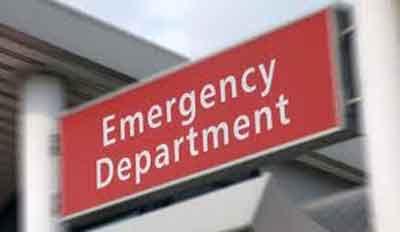- Home
- Editorial
- News
- Practice Guidelines
- Anesthesiology Guidelines
- Cancer Guidelines
- Cardiac Sciences Guidelines
- Critical Care Guidelines
- Dentistry Guidelines
- Dermatology Guidelines
- Diabetes and Endo Guidelines
- Diagnostics Guidelines
- ENT Guidelines
- Featured Practice Guidelines
- Gastroenterology Guidelines
- Geriatrics Guidelines
- Medicine Guidelines
- Nephrology Guidelines
- Neurosciences Guidelines
- Obs and Gynae Guidelines
- Ophthalmology Guidelines
- Orthopaedics Guidelines
- Paediatrics Guidelines
- Psychiatry Guidelines
- Pulmonology Guidelines
- Radiology Guidelines
- Surgery Guidelines
- Urology Guidelines
Risk of long-term disability in older adults who visit the ED : Annals of Emergency Medicine

Older adults who go to the emergency department (ED) for an illness or injury are at increased risk for disability and decline in physical abilities up to six months later, according to a study by Yale researchers.
The study was published in the Annals of Emergency Medicine.
Most adults aged 65 and older who visit the emergency department each year are treated and sent home. Previous work by senior author Thomas M. Gill, M.D., the Humana Foundation Professor of Medicine (geriatrics) at Yale School of Medicine, and his colleagues showed that older adults are more likely to experience disability and declines in function after a hospitalization. But few studies have examined what happens in this population after a visit to and discharge from the ED.
For their study, the Yale team used prospective data collected on more than 700 older adults over 14 years. The researchers used a scoring system to assess the presence and severity of disability among adults who had visited the ED and been discharged, been hospitalized after an ED visit, or not come to the ED at all (the control group). The research team also analyzed nursing home admissions and mortality after an ED visit.
The researchers found that the discharged group had significantly higher disability scores than the control group. Those patients were also more likely to be living in a nursing home, and to die, in the six-month period after going to the ED. Participants who had been hospitalized had the highest disability scores.
"We know that if older persons go to the hospital and are admitted, they are at increased risk of disability and functional decline. This study shows that patients discharged from the ED, meaning that they were deemed well enough to return home, are also at risk for functional decline," said first author Justine M. Nagurney, M.D., a resident in Emergency Medicine at Yale New Haven Hospital. "We should be doing something to address that."
Strategies to address the problem might include assessments of function in the ED, which could be conducted by care transition coordinators or geriatric specialists, Nagurney noted. For example, some EDs employ geriatric advanced practice nurses to assess patients' risk for functional decline.
"Patients may benefit from ED-based initiatives to evaluate and potentially intervene upon changes in disability status," she said.
The estimated additional cost of medical care and long-term care for newly disabled older adults in the United States is $26 billion per year, the authors noted.

Disclaimer: This site is primarily intended for healthcare professionals. Any content/information on this website does not replace the advice of medical and/or health professionals and should not be construed as medical/diagnostic advice/endorsement or prescription. Use of this site is subject to our terms of use, privacy policy, advertisement policy. © 2020 Minerva Medical Treatment Pvt Ltd